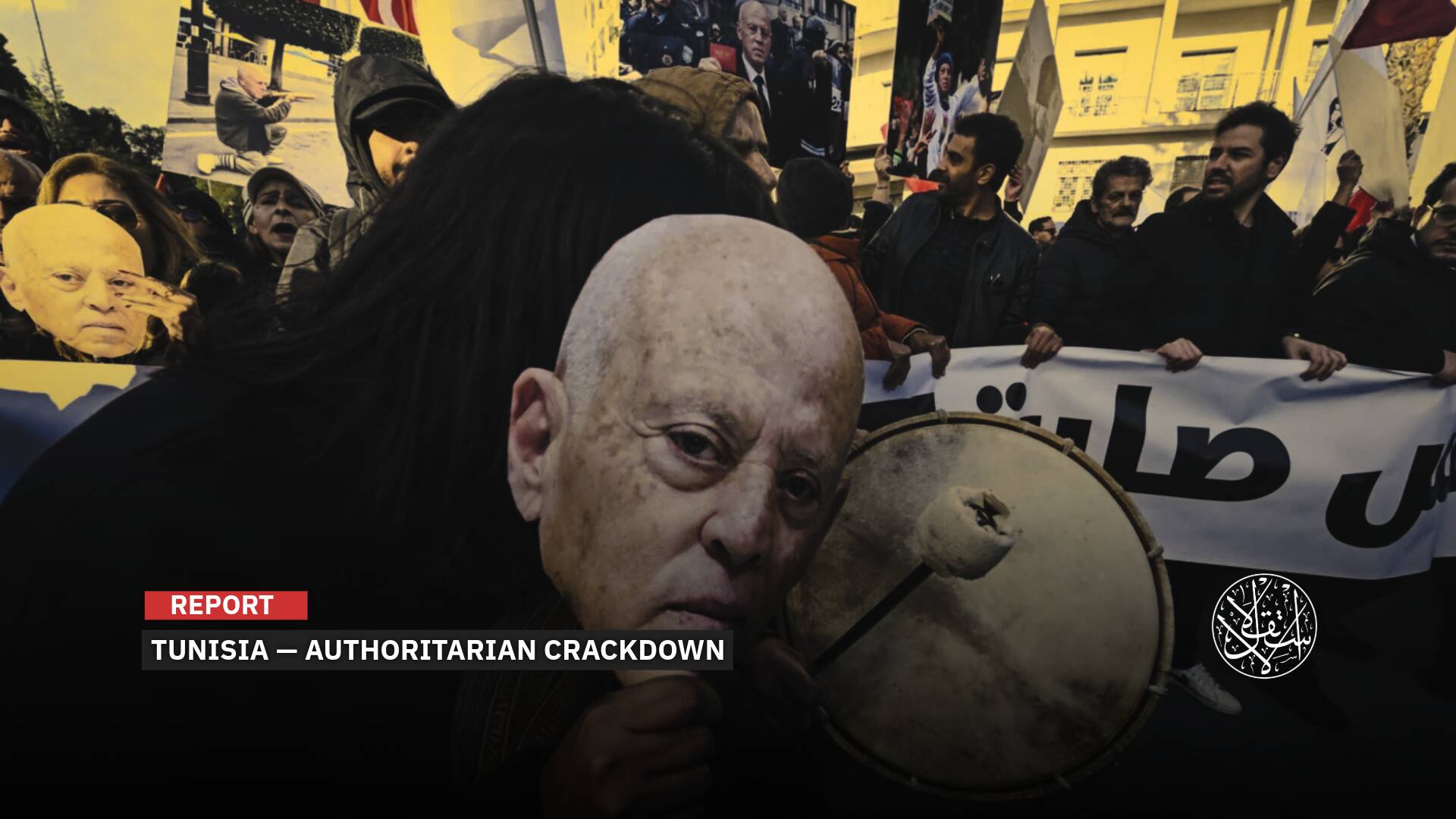Khaled Al-Jundi, the Egyptian Preacher Who Flirts the Egyptian Regime and Praises the Prisons of Tyranny

It was common for religious preachers to be part of the authority tools to control power and to promote political leaders.
But what is new in Egypt is that those preachers who are close to the head of the regime go beyond preaching the era of Abdel-Fattah Sisi, to the extent of becoming ridiculous.
This is exactly what was represented in the narration of the member of the Supreme Council for Islamic Affairs, Sheikh Khaled Al-Jundi, of the virtues of Egyptian prisons.
In an interview with an Egyptian satellite channel on August 12, 2021, the sheikh confirmed that "imprisonment restores human vitality and activity," which caused a wide wave of ridicule.
This was not the most prominent statement of the Al-Jundi, who has been active in the Egyptian social and media space for more than two decades.
He was one of the prominent preachers during the era of former President Hosni Mubarak, and many controversial positions were raised about him.
His closeness to the ruling class, in addition to artists, athletes and celebrities, was the subject of criticism from many.
His fatwas, which caused sharp controversies, and his collision with Islamic currents of various orientations and sects, also remained a confusing position. His strong opposition to the rule of the late President Mohamed Morsi, issued by the vanguard of his opponents, confirms his orientation towards only one type of power, which is the military.
But his support for the military coup in mid-2013, and the spilling of the blood of the protesters in the fields of "Rabaa" and "Al-Nahda", ended hopes that Al-Jundi may change his positions on the authority despite its brutality.
He continued his support for the regime, and even became a herald of its president and one of its staunchest supporters.
Sheikh of ‘Business’
He is Khaled Abdel Mohsen Al-Husseini Al-Jundi, he was born in the "New Helmiya" area in the Egyptian capital, Cairo, on December 14, 1961.
Al-Jundi graduated from the Faculty of Fundamentals of Religion, Department of Hadith and its Sciences, then Department of Interpretation and its Sciences, and obtained a master’s degree in Hadith Sciences from Al-Azhar University.
He began his working life as an imam and preacher at the Ministry of Awqaf until he reached the rank of "chief imam", but the great boom in his life began during the era of former President Hosni Mubarak.
A ministerial decision was issued appointing him as a member of the Supreme Council for Islamic Affairs in the Religious Media Committee.
The story of his rise was published by the magazine "Islamic Affairs" in a report on December 29, 2020.
About "the secret of Khaled Al-Jundi's fame," it said: "He was a preacher for endowments at the Sayeda Zeinab Mosque (in Cairo), and he gained relative fame because of his different style and presentation."
It added: "All this did not bring about a significant change in his life, because his situation is a common factor among many preachers."
As for the transformation that occurred later, "it was at the beginning of the first millennium of the 21st century, due to the idea of business, what was called at the time (the Islamic phone)," according to "Islamic Affairs".
The "Islamic phone" is an idea that Al-Jundi put forward in cooperation with mobile phone companies in Egypt to answer the Egyptians' fatwas in return for a fee.
It explained: "This matter was transferred by a qualitative leap, from Mrs. Zainab, the poor, popular neighborhood, to the high-end neighborhoods, and he owned a fleet of luxury cars."
The rapid and successive developments in Al-Jundi's life led him to establish the "Azhari TV" satellite channel in 2009, and his journey towards "business through religion and fatwa" continued, according to the magazine.
He was accused of "introducing profits and money into religious fatwas", and was subjected to an attack campaign by some local media outlets, but he responded via the "Al-Arabiya" website on May 21, 2006.
He said: "If the taxi fare to Dar Al-Fatwa costs 10 pounds, and the fatwa over the phone costs three pounds for the call, then where is the fee?"
When asked about the size of his wealth and the cars he owns, he said mockingly: "I own three cars, not including a Mercedes, but I will have it at the end of the year."
On May 5, 2018, the local "Veto" website published a list of the highest paid preachers on satellite channels during the month of Ramadan.
At that time, the Al-Jundi came second with 120,000 pounds per month, after the controversial professor at Al-Azhar, Dr. Mabrouk Attia, with 200,000 pounds.
Legitimizing Authority
Since his ascension, Al-Jundi has approached by all means the authority and the ruler, and he has not hesitated to support the head of the regime without expressing any kind of opposition.
His episode, which was shown on June 15, 2021, through the "DMC" channel of the intelligence service, caused a lot of controversy.
He confirmed that "he used to describe himself as the sheikh of the Sultan," while this was not his first to attribute to himself this description, but rather he wanted to establish it always.
On March 28, 2019, he said: "It is neither an insult nor a fault, I will say it proudly: I am the sheikh of the Sultan, because if you do not say that, you will remain without privilege."
In early April 2019, during his interview with the media, Amr Adib, on MBC, he praised Sisi.
He prayed, "I ask God to gather me with Sisi on the Day of Resurrection."
While Al-Jundi attacked the opponents, describing them as exploiting religion. He said about them: "They are the enemies of Islam, Kharijites and Tatars, and they are the reason for the loss of the country."
Benefits of ‘Prison’
Through the “May they Understand” program on the “MBC” satellite channel, August 12, 2021, Sheikh Khaled Al-Jundi made statements that were described as reprehensible and strange.
Under his claim about the "benefits of prisons", he said: "Prisons in Egypt have restored human vitality and activity."
Al-Jundi's statements contradict the painful reality of Egyptian prisons, and the death of hundreds of detainees as a result of the arbitrary conditions of detention and retaliatory measures by the security services.
This is confirmed by Amnesty International in its report on January 21, 2021.
"Prison officials in Egypt subject prisoners of conscience and others detained on political basis to torture," it said.
It noted harsh and inhumane conditions of detention in Egyptian prisons, and that they "deliberately deprive them of health care as punishment for their opposition."
It reported that "Amnesty International investigated the deaths of 12 people while in custody or shortly after their release."
It stressed that "the organization has knowledge of the cases of 37 other people who died in 2020 inside detention centers."
However, the organization was unable to obtain the consent of their families to publish the details of the cases due to their fear of reprisals.
Egyptian human rights groups estimate that “hundreds of people have died in places of detention since 2013.”
According to "Amnesty", the Egyptian authorities refuse to disclose the number of prisoners in the country, and estimates indicate that the number is about 114,000.
This is more than double the prison capacity, which Sisi estimated in December 2020, at about 55,000 prisoners.
The appalling assessments and accounts that Al-Jundi ignored, indicating that prisons restore their vitality and physical activity to the inmates, made him fall into the trap of fraud, as his critics pointed out.
Accused of Fraud
Al-Jundi's claim on September 8, 2019, that he had studied 250,000 volumes, infuriated many.
So that the Salafi Sheikh Abu Ishaq Al-Huwaini replied to him, saying: “He did not know anyone in this world who read this number of volumes, let alone to study them.”
This prompted some to calculate the extent to which the soldier could study a quarter of a million volumes.
It seemed mathematically that if he began studying 50 years ago, this means that he studied 5,000 volumes every year, that is, more than 13 volumes per day, which is something beyond human capacity.
He issued a fatwa supporting the “royal mummies procession” under the auspices of Sisi, April 3, 2021, in Fustat, east of Cairo.
A ceremony that sparked controversy over the identity of Egypt, and fears that the regime would impose the pharaonic identity as an alternative to the Islamic Arab.
Sources
- Egypt: Prisoners' Lives at Risk Due to Abuses and Denial of Health Care [Arabic]
- Biography: Khaled Al-Jundi [Arabic]
- 'Business Sheikhs' in Ramadan; Mabrouk Attia, the Highest Paid With 200 Thousand Pounds; 120 Thousand for Khaled Al-Jundi [Arabic]
- Khaled Al-Jundi: I Am the Sheikh of the Sultan With Pride, and My Loyalty Is to My Country [Arabic]
- The Sultan's Sheikhs and the Slavery Syndrome: From Khaled Al-Jundi to Ali Gomaa! [Arabic]







